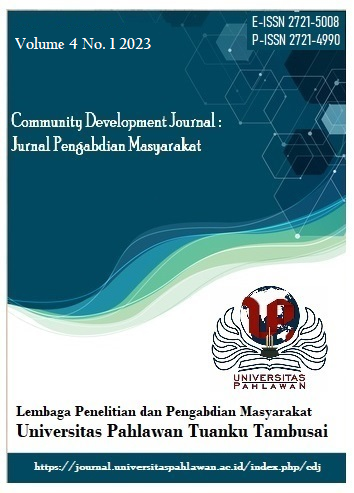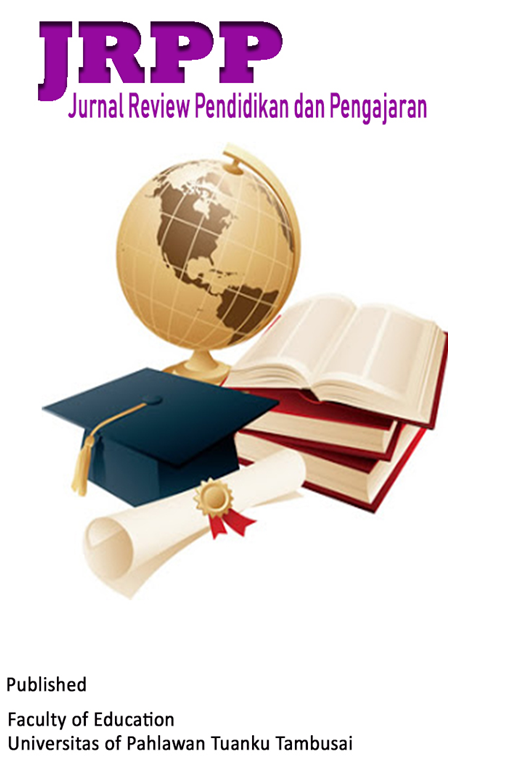WOMEN’S ENTREPRENEURSHIP: AN EXAMINATION OF GOVERNMENT SUPPORT AND THE ROLE OF KNOWLEDGE SKILLS
DOI:
https://doi.org/10.31004/cdj.v4i1.12464Keywords:
Women, Entrepreneurship, Knowledge, Skills, GovernmentAbstract
In recent years the study of women’s entrepreneurship has seen a growth, especially during the pandemic and its aftermath. According to the literature women can make a significant contribution to entrepreneurial activity. This research aims to provide evidence that government support factors can create women's entrepreneurship. Not only that, the author will also add literature on knowledge skills in fostering the entrepreneurial spirit for women. This research includes library research, because the research is conducted to search, analyze, make interpretations and generalizations from the facts of the results of thoughts and ideas written by entrepreneurship experts. This research is descriptive qualitative with a secondary data analysis approach. This study found that the government has a crucial role in creating women's entrepreneurship both before and after the pandemic. On the other hand, the knowledge skill aspect is a supporting factor for women's success in starting a career as an entrepreneur. This research is expected to enrich both formal and informal entrepreneurship literature.References
Aditya, I. (2022, November). UMKM Perempuan Indonesia Mencapai 37 Juta Orang. Krjogja.Com. https://www.krjogja.com/peristiwa/read/479517/umkm-perempuan-indonesia-mencapai-37-juta-orang#:~:text=Sementara%20jumlah%20wirausaha%20perempuan%20sebanyak,sebesar%2022%2C5%20persen%20yoy.
Afroze, T., Alam, M. K., Akther, E., & Jui, N. S. (2015). Women Entrepreneurs in Bangladesh- Challenges and Determining Factors. Journal of Business and Technology (Dhaka), 9(2), 27–41. https://doi.org/10.3329/jbt.v9i2.26194
Aidis, R., Estrin, S., & Mickiewicz, T. (2008). Institutions and entrepreneurship development in Russia: A comparative perspective. Journal of Business Venturing, 23(6), 656–672. https://doi.org/10.1016/j.jbusvent.2008.01.005
Ausat, A. M. A. (2023). The Application of Technology in the Age of Covid-19 and Its Effects on Performance. Apollo - Journal of Tourism and Business, 1(1), 14–22. https://doi.org/10.58905/apollo.v1i1.8
Ausat, A. M. A., & Suherlan, S. (2021). Obstacles and Solutions of MSMEs in Electronic Commerce during Covid-19 Pandemic: Evidence from Indonesia. BASKARA: Journal of Business and Entrepreneurship, 4(1), 11–19. https://doi.org/10.54268/BASKARA.4.1.11-19
Bahmani-Oskooee, M., Kutan, A. M., & Xi, D. (2013). The impact of economic and monetary uncertainty on the demand for money in emerging economies. Applied Economics, 45(23), 3278–3287. https://doi.org/10.1080/00036846.2012.705430
Bardasi, E., Sabarwal, S., & Terrell, K. (2011). How do female entrepreneurs perform? Evidence from three developing regions. Small Business Economics, 37(4), 417–441. https://doi.org/10.1007/s11187-011-9374-z
Basri, M. (2001). Metodologi Penelitian Sejarah. Restu Agung.
Beqo, I., & Gehrels, S. A. (2014). Women entrepreneurship in developing countries: A European example. Research in Hospitality Management, 4(1–2), 97–103. https://doi.org/10.1080/22243534.2014.11828320
Brush, C. G., de Bruin, A., & Welter, F. (2009). A gender?aware framework for women’s entrepreneurship. International Journal of Gender and Entrepreneurship, 1(1), 8–24. https://doi.org/10.1108/17566260910942318
Cardella, G. M., Hernández-Sánchez, B. R., & Sánchez-García, J. C. (2020). Women Entrepreneurship: A Systematic Review to Outline the Boundaries of Scientific Literature. Frontiers in Psychology, 11(7), 1557. https://doi.org/10.3389/fpsyg.2020.01557
Elam, A. B., B. C. G., Greene, P. G., Baumer, B., Dean, M., & Heavlow, R. (2019). Global Entrepreneurship Monitor 2018/2019 Women’s Entrepreneurship Report. Global Entrepreneurship Research Association, London Business School, Regents Park, London NW1 4SA.
Erogul, M. S., & Quagrainie, F. A. (2018). Conceptualising entrepreneurial orientation dimensions and female business performance in developing economies. J. for International Business and Entrepreneurship Development, 11(2), 118–139. https://doi.org/10.1504/JIBED.2018.10012216
Estrin, S., & Mickiewicz, T. (2011). Entrepreneurship in Transition Economies: The Role of Institutions and Generational Change (M. Minniti, Ed.). Oxford University Press.
Franzke, S., Wu, J., Froese, F. J., & Chan, Z. X. (2022). Female entrepreneurship in Asia: a critical review and future directions. Asian Business & Management, 21(3), 343–372. https://doi.org/10.1057/s41291-022-00186-2
Guan, C., Wen, X., Gong, Y., Liang, Y., & Wang, Z. (2014). Family Environment and Depression. Journal of Family Issues, 35(4), 481–500. https://doi.org/10.1177/0192513X12474624
Handayani, I. (2021, March). Kewirausahaan Perempuan Jadi Peluang Keluar Krisis di Masa Pandemi. BERITA SATU. https://www.beritasatu.com/ekonomi/743021/kewirausahaan-perempuan-jadi-peluang-keluar-krisis-di-masa-pandemi
Hechavarria, D., Bullough, A., Brush, C., & Edelman, L. (2019). High-Growth Women’s Entrepreneurship: Fueling Social and Economic Development. Journal of Small Business Management, 57(1), 5–13. https://doi.org/10.1111/jsbm.12503
Juang, A. D. (2021, December). Peringatan Hari Ibu 2021, Telah Banyak Pengusaha Perempuan Tangguh di Pentas Global. Darahjuang.Online. https://darahjuang.online/peringatan-hari-ibu-2021-telah-banyak-pengusaha-perempuan-tangguh-di-pentas-global/
Kemenko, P. (2021, October). Pemerintah Dorong UMKM Perempuan untuk Bangkit, Tangguh, dan Naik Kelas. Ekon.Go.Id. https://ekon.go.id/publikasi/detail/3348/pemerintah-dorong-umkm-perempuan-untuk-bangkit-tangguh-dan-naik-kelas
Kemenpppa. (2020a, October). Perempuan Berpotensi Besar Perkuat Roda Perekonomian di Tengah Pandemi Covid-19. Kemenpppa.Go.Id. https://www.kemenpppa.go.id/index.php/page/read/29/2904/perempuan-berpotensi-besar-perkuat-roda-perekonomian-di-tengah-pandemi-covid-19
Kemenpppa. (2020b, November). Geliatkan UMKM Indonesia, Perempuan Jadi Pahlawan Ekonomi Keluarga. Kemenpppa.Go.Id. https://www.kemenpppa.go.id/index.php/page/read/29/2972/geliatkan-umkm-indonesia-perempuan-jadi-pahlawan-ekonomi-keluarga
Kemenpppa. (2021, November). Peran Penting Kelompok Intelektual Keagamaan Keagamaan untuk Ekonomi Perempuan dan Bangsa. Kemenpppa.Go.Id. https://www.kemenpppa.go.id/index.php/page/read/29/3509/peran-penting-kelompok-intelektual-keagamaan-untuk-ekonomi-perempuan-dan-bangsa
Langowitz, N., & Minniti, M. (2007). The Entrepreneurial Propensity of Women. Entrepreneurship Theory and Practice, 31(3), 341–364. https://doi.org/10.1111/j.1540-6520.2007.00177.x
Léger-Jarniou, C., Nelson, T., & Chasserio, S. (2015). Research on Women Entrepreneurs: Putting the French-speaking Perspective into Context. Revue de l’Entrepreneuriat, Vol. 14(2), 7–17. https://doi.org/10.3917/entre.142.0007
Mahbub, U. H. (2000). Human Development Centre, Human Development in South Asia: The Gender Question (Oxford University Press), Disadvantages and self- enterprises. Female in Management Review, 19(1), 5–17.
Mark, W., Dickson, P., & Wake, F. (2006). Entrepreneurship and education: What Is Known and not known about the links between education and entrepreneurial activity. The small business economy for data year 2005.
Marthalina. (2018). Pemberdayaan Perempuan dalam Mendukung Usaha Mikro, Kecil, dan Menengah (UMKM) di indonesia. Jurnal Pembangunan Pemberdayaan Pemerintahan, 3(1), 59–76.
Narimawati, U., & Praratya, S. A. (2022). Women Leadership in Technopreneurship (D. Sunarsi, Ed.; 1st ed.). Cipta Media Nusantara.
Naser, K. W., & Nuseibeh, R. (2009). Factors that affect women entrepreneurs: Evidence from an emerging economy. International Journal of Organizational Analysis, 17(3), 225–247.
Noguera, M., Alvarez, C., & Urbano, D. (2013). Socio-cultural factors and female entrepreneurship. International Entrepreneurship and Management Journal, 9(2), 183–197. https://doi.org/10.1007/s11365-013-0251-x
Nurjanna, & Sahabuddin, R. (2022). Keputusan Berwirausaha Kalangan Wanita di Kota Makassar (A. Karim & A. F. Rahman, Eds.; 1st ed.). Nas Media Pustaka.
Pratiwi, A. N. F. (2021, May). Biodata Melinda Gates Istri Bill Gates yang Cerai Setelah 27 Tahun Nikah & Lika-liku Rumah Tangganya. SURYA.Co.Id. https://surabaya.tribunnews.com/2021/05/05/biodata-melinda-gates-istri-bill-gates-yang-cerai-setelah-27-tahun-nikah-lika-liku-rumah-tangganya?page=2
Tambunan, T. T. H. (2017). Women Entrepreneurs in MSEs in Indonesia: Their Motivations and Main Constraints. International Journal of Gender and Women’s Studies, 5(1), 88–100. https://doi.org/10.15640/ijgws.v5n1p9
Tanklevska, N. (2020). Current Trends in the Development of Women’s Entrepreneurship in Ukraine. JEL Class?f?cat?on L26, J16, 0(3(39)), 81–91. https://doi.org/10.18371/fp.3(39).2020.215162
Zunaidi, A., & Maghfiroh, F. L. (2021). The Role of Women In Improving The Family Economy. Dinar: Jurnal Ekonomi Dan Keuangan Islam, 8(1), 61–79. https://doi.org/10.21107/dinar.v8i1.10581

Downloads
Published
Versions
- 2023-02-25 (2)
- 2023-02-25 (1)
How to Cite
Issue
Section
License
Copyright (c) 2023 Silvy Sondari Gadzali, Muhammad Ade Kurnia Harahap, Ira Modifa Tarigan, Abdullah Akhyar Nasution, Abu Muna Almaududi Ausat

This work is licensed under a Creative Commons Attribution-ShareAlike 4.0 International License.















